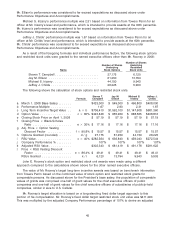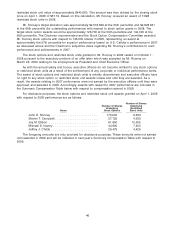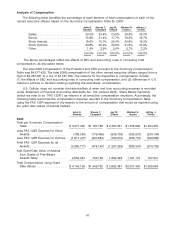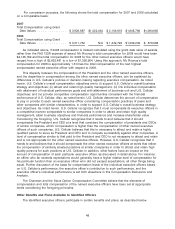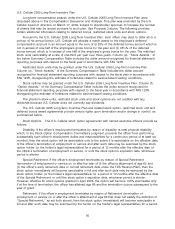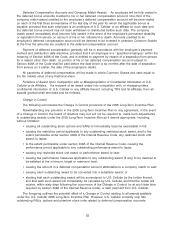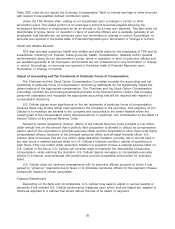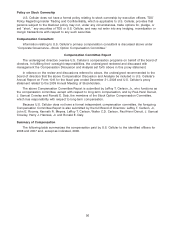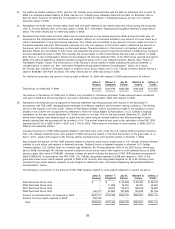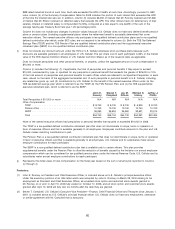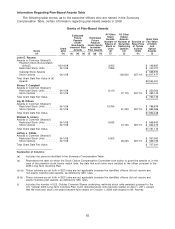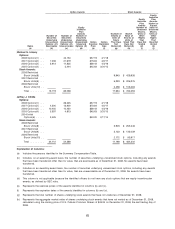US Cellular 2008 Annual Report Download - page 62
Download and view the complete annual report
Please find page 62 of the 2008 US Cellular annual report below. You can navigate through the pages in the report by either clicking on the pages listed below, or by using the keyword search tool below to find specific information within the annual report.Table. SEC rules do not require the Summary Compensation Table to include earnings or other amounts
with respect to tax-qualified defined contribution plans.
Under the TDS Pension Plan, vesting is not accelerated upon a change in control or other
termination event. The vested portion of an employee’s account becomes payable following the
employee’s termination of employment as (a) an annuity or (b) a lump sum payment. This plan does not
discriminate in scope, terms, or operation in favor of executive officers and is available generally to all
employees, and benefits are not enhanced upon any termination or change in control. Accordingly, no
amounts are reported in the below table of Potential Payments upon Termination or Change in Control.
Health and Welfare Benefits
TDS also provides customary health and welfare and similar plans for the employees of TDS and its
subsidiaries, including U.S. Cellular. These group life, health, hospitalization, disability and/or medical
reimbursement plans do not discriminate in scope, terms or operation, in favor of executive officers and
are available generally to all employees, and benefits are not enhanced upon any termination or change
in control. Accordingly, no amounts are reported in the below table of Potential Payments upon
Termination or Change in Control.
Impact of Accounting and Tax Treatments of Particular Forms of Compensation
The Chairman and the Stock Option Compensation Committee consider the accounting and tax
treatments of particular forms of compensation. Accounting treatments do not significantly impact the
determinations of the appropriate compensation. The Chairman and the Stock Option Compensation
Committee consider the accounting treatments primarily to be informed and to confirm that company
personnel understand and recognize the appropriate accounting that will be required with respect to
compensation decisions.
U.S. Cellular places more significance on the tax treatments of particular forms of compensation,
because these may involve actual cash expense to the company or the executive. One objective of U.S.
Cellular is to maximize tax benefits to the company and executives to the extent feasible within the
overall goals of the compensation policy discussed above. In particular, one consideration is the effect of
Section 162(m) of the Internal Revenue Code.
Subject to certain exceptions, Section 162(m) of the Internal Revenue Code provides a one million
dollar annual limit on the amount that a publicly held corporation is allowed to deduct as compensation
paid to each of the corporation’s principal executive officer and the corporation’s other three most highly
compensated officers, exclusive of the principal executive officer and principal financial officer. U.S.
Cellular does not believe that the one million dollar deduction limitation currently has or should have in
the near future a material adverse effect on U.S. Cellular’s financial condition, results of operations or
cash flows. If the one million dollar deduction limitation is expected to have a material adverse effect on
U.S. Cellular in the future, U.S. Cellular will consider ways to maximize the deductibility of executive
compensation, while retaining the discretion U.S. Cellular deems necessary to compensate executive
officers in a manner commensurate with performance and the competitive environment for executive
talent.
U.S. Cellular does not have any arrangements with its executive officers pursuant to which it has
agreed to ‘‘gross-up’’ payments due to taxes or to otherwise reimburse officers for the payment of taxes,
except with respect to certain perquisites.
Financial Restatement
Depending on the facts and circumstances, U.S. Cellular may seek to adjust or recover awards or
payments if the relevant U.S. Cellular performance measures upon which they are based are restated or
otherwise adjusted in a manner that would reduce the size of an award or payment.
55


